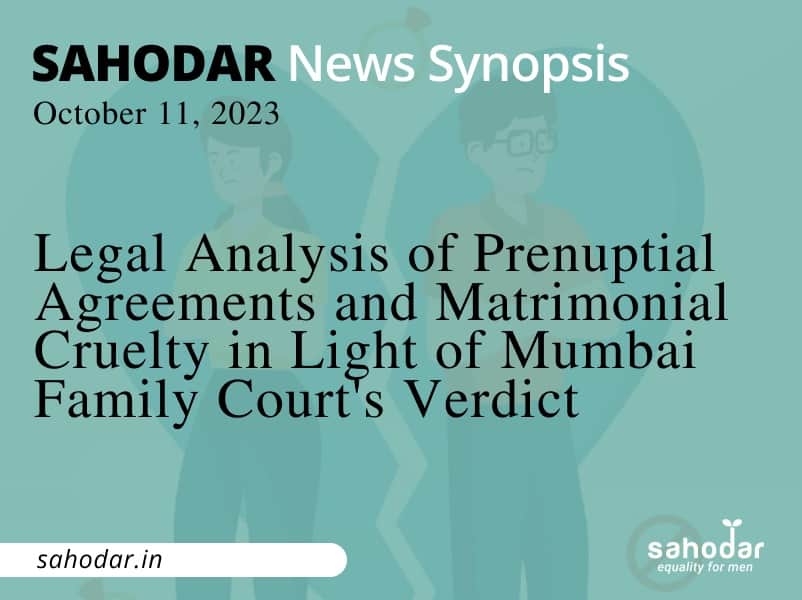Introduction
In a recent adjudication handed down by the Family Court in Mumbai, a profound inquiry into the legal status and import of prenuptial agreements within the Indian legal framework was undertaken. The court, while cognizant of the non-binding nature of prenuptial agreements under Indian law, embarked on a jurisprudential exploration of their relevance as evidentiary tools, particularly in the context of deciphering the intentions and dynamics inherent in marital relationships. This judgment represents a watershed moment in Indian family law by heralding an interpretative paradigm wherein prenuptial agreement are accorded a more pronounced role in shedding light on the intricacies of matrimonial disputes, especially those laden with allegations of cruelty.
The Case
The case under consideration revolved around the petitioner and the respondent, who entered into matrimony subsequent to their initial connection via a digital matrimonial platform. Their conjugal bond, however, was of brief duration, leading the petitioner, represented by Advocate Kanupriya Kejriwal, to invoke the jurisdiction of the Family Court for a divorce on grounds of cruelty.
The petitioner’s narrative commenced with the claim that his acquaintance with the respondent dates back to 2009, via an online platform, and their association was rekindled in 2012. He alleged that he was coerced into marriage by the respondent’s emotional entreaties, rooted in the dire condition of her mother’s health, ostensibly exacerbated by her unmarried status. Their brief marital sojourn was punctuated by verbal altercations and discord stemming from incongruous sexual preferences, with the petitioner further accusing the respondent of subjecting his mother and sister to mistreatment.
On a pivotal date, the respondent unilaterally absconded from the petitioner’s mother’s domicile, appropriating select personal effects, including jewelry gifted to her by the petitioner’s mother. Pertinently, the petitioner raised allegations that the respondent staged an unscheduled visit to his mother’s residence, accompanied by a contingent of individuals, purportedly her relatives, ostensibly for the purpose of resolving the discord.
The Court’s Discernment
The Family Court undertook a comprehensive evaluation of the factual matrix and legal aspects of the case, attaching particular significance to the petitioner’s aversion to conjugal relations and the prenuptial agreement executed on July 11, 2016. The court’s analysis yielded a salient contextual differentiation in the present case.
Both parties were firmly ensconced within the mid-40s age demographic, and the petitioner had grappled with the anguish of familial bereavement, which emerged as a pivotal factor affecting the texture of their marital relationship. The court took cognizance of the rationale proffered by the petitioner for eschewing physical intimacy and duly underscored the probative force of WhatsApp communications that illuminated his consistent emotional support.
Ultimately, the court reached the inexorable conclusion that the petitioner’s psychological state, compounded by the emotional impact of familial bereavement and the influence brought to bear by the respondent and her mother, rendered his matrimonial engagement an outcome of duress. Notably, the prenuptial agreement, which functioned as a preemptive instrument against prospective legal skirmishes, emerged as an emblem of their initial intention to establish a partnership, distinct from the conventional marital bond, in the court’s interpretation.
The Verdict
In the denouement of its extensive deliberations, the court adjudged the conduct of the respondent as constitutive of matrimonial cruelty. It underscored the dearth of genuine matrimonial involvement from the outset, with the relationship stagnating over time. Consequently, invoking the provisions of Section 13(1)(i-a) of the Hindu Marriage Act, 1955, the court ruled in favour of the petitioner.
Conclusion
The judgment issued by the Family Court in Mumbai signifies a doctrinal shift in the legal treatment of prenuptial agreements, accentuating their role as instruments of evidentiary import. While Indian law continues to view prenuptial agreements as non-binding, this decision amplifies their utility in elucidating the intentions of parties in a marital context. In so doing, it establishes a salient precedent in Indian family law, reiterating the importance of a holistic examination of the sui generis features of each case, particularly in matters laden with allegations of matrimonial cruelty.

